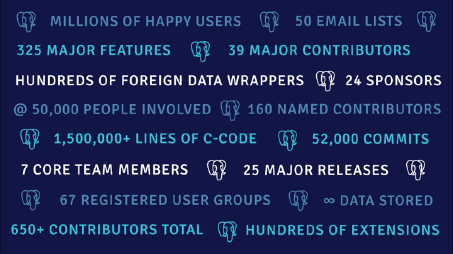PostgreSQL is an advanced, open source object-relation database system. It uses and extends the SQL language combined with many features that safely store and scale the most complicated data workloads. PostgreSQL originates from Ingres (later renamed Postgres) and dates back from 1986. It has evolved over the past 35 years and keeps updating itself with new features to maintain the title of ‘most advanced database’.
DBMS of the year
Did you know PostgreSQL was named Database Management System of the year in 2020 by DB-Engines? PostgreSQL already won the title in 2017 and 2018. It is the only system that won this title three times! But then why are people saying relational databases are dying? According to DB-engines, all of the other major relational databases are in decline. MySQL, SQLServer and DB2 have all been showing a steady decline over the years.
So what is PostgreSQL doing differently? Is it because PostgreSQL is a community driven open source, whereas MySQL, MariaDB, etc are controlled by a vendor? We will take a look at the advantages of PostgreSQL, compare it to other database systems and see if it is still relevant in these times.
SQL or NoSQL?
First of all, PostgreSQL is not just a relational database. They implemented NoSQL features. Not all of the features are available (like the lack of horizontal scaling), but it does give Postgres an advantage. It can combine both SQL and NoSQL practices. Support for JSON, XML, Hstore and Cstore documents actually transforms PostgreSQL into a NoSQL database. It has multiple advantages over other NoSQL databases, such as MongoDB. Because why choose SQL or NoSQL, when you can use features of both with Postgres?
Besides that, Postgres never stops optimizing itself. Including improvement of unstructured types of data as well. Because of that, Postgres is super extensible. It can support numerous data types like GIS, JSONB, network address types, timezone-ware timestamps… An advantage that MySQL doesn’t offer.
Performance driven and Reliable
The performance of PostgreSQL is also among the best. Numerous features have been implemented to boost and optimize its performance. Some of those were parallelization of read queries, powerful indexing methods and multiversion concurrency control.
Not only do they care about performance, it also provides the highest care for your data. Thanks to sophisticated replication options, your data will always be safe.
A big community
Finally, another strong advantage is the documentation and the support around PostgreSQL. You can find an answer to almost any question you have. On top of that, the community is really big and the general rule of open source is ‘the bigger the community, the higher the value for users’. Thanks to the big community, features are easily implemented, the newest developments are being monitored and people are constantly focused on making Postgres the best version of itself.
PostgreSQL is not a purpose. It is a bit cliché, but the journey is more important than the destiny. Nobody knows where Postgres is going. The community is free to decide which direction they want to go in. Which gives them the freedom to focus on the most relevant and needed features.
So yes, we can say PostgreSQL is still relevant. By updating itself and following the latest trends, it makes sure it keeps being a relevant and well-performing system. And the community confirms this! The community is big and keeps on growing. As of today, Postgres can count on:







